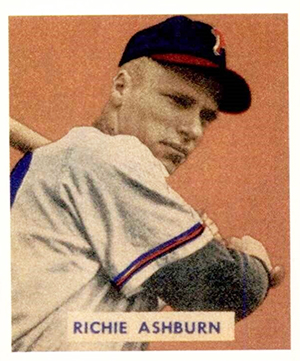
Word of the Day: Proximity
Today’s word of the day, thanks to the Britannica Dictionary, is proximity. Proximity is a noun that means “the state of being near” (https://www.britannica.com/dictionary/eb/word-of-the-day). A broader definition says, “nearness in place, time, order, occurrence, or relation” (https://www.dictionary.com/browse/proximity). The word entered the language “late 15c., proxymyte [Caxton], from French proximité ‘nearness’ (14c.), from Latin proximitatem (nominative proximitas) ‘nearness, vicinity,’ from proximus ‘nearest, next; most direct; adjoining,’ figuratively ‘latest, most recent; next, following; most faithful,’ superlative of prope ‘near’” (https://www.etymonline.com/search?q=proximity).
On this date in 1927, Don Richard Ashburn was born in Tilden, Nebraska, a town which has hovered around 1000 population since 1930. Growing up in this tiny town, Ashburn was a regular, All-American boy, playing baseball in the little league, playing basketball for his high school, but not playing football, and undoubtedly dreaming of being a professional athlete. His father advised him to catch, suggesting that that was the fastest route to the major leagues, and to bat left handed because of his speed (https://sabr.org/bioproj/person/richie-ashburn/). And it worked, sort of. Ashburn was offered a contract by the Cleveland Indians in 1943, when he was just sixteen years old, but baseball’s commissioner, the somewhat infamous Kennesaw Mountain Landis, voided it because it was against baseball’s rules to sign a kid who was still in high school.
He was signed again in 1944, this time by the Chicago Cubs to play for their minor-league franchise in Nashville, but this contract was also voided because it contained a clause that would have paid Ashburn off if the franchise was sold while he was playing there (ibid.). Yeah, I don’t really get that either. After two negative experiences, Ashburn, with his father’s support, tried junior college, but after one semester, he signed a contract with the Philadelphia Philles (ibid.).
“Ashburn reported to the Utica Blue Sox of the Class A Eastern League in 1945 and it was there that his speed finally changed everyone’s mind about his future position in baseball. He utterly astounded them on one occasion when he beat the batter to first base and took the throw for a putout. His manager, future Whiz Kids pilot Eddie Sawyer, forthwith converted the speedster to a center fielder.… During his time in Utica the players started calling Ashburn Whitey because of his light blond hair. The new moniker stayed with him for the rest of his life” (ibid.).
Richie Ashburn’s career last 15 years in the bigs, the first 12 for the Phillies, then two for the Cubs and one for the brand new New York Mets. With the Phillies, he led the league in hitting twice (once both leagues), led the league in walks four times, led the majors in triples twice, led the leagues in hits twice, and led the league in stolen bases his rookie year despite playing only 117 games. He was an all-star four times, and he led the team to the World Series in 1950, the famous Whiz Kids, so called because the team was very young (https://www.baseball-reference.com/players/a/ashburi01.shtml).
Ashburn had a lifetime batting average of .308, and is third all time in outfield put outs. I never got to see him play, but he was one of my dad’s favorites. He was finally inducted into the MLB Hall of Fame by the veterans committee.
That last season, with the Mets, he made the All-Star Team one more time and was voted the team’s most valuable player. He later said, ““…to be voted the MVP on the worst team in the history of baseball is a dubious honor for sure. I was awarded a 24-foot boat equipped with a galley and sleeping facilities for six. After the season had ended, I docked the boat in Ocean City, New Jersey, and it sank” (https://sabr.org/bioproj/person/richie-ashburn/).
After his career ended at the end of the 1962 season, a season in which he hit .306 in 135 games for the Mets, he became a broadcaster for the Phillies. He could have kept playing and made a lot more money than he did as a broadcaster, at least at first, but he was an undoubted success in his new career. He became one of the most popular athletes in Philadelphia history, and stayed in the broadcast booth for 35 years. His initial partners, Bill Campbell and By Saam, were replaced in 1971 by Harry Kalas, the play-by-play voice of the Phillies for many, many years (ibid.).
On September 8, 1997, Whitey Ashburn and Harry Kalas called a Phillies game in New York. The Phils pounded the Mets that night, 13-4. Scott Rolen went 2 for 2 with a home run and 3 walks. Mike Grace got the win despite pitching just 5 innings, giving up 5 hits and four earned runs. After the game, as was his wont, Richie Ashburn went back to his hotel room by himself, though he did reach out to a Phillies official that he wasn’t feeling well. The next morning, at 5:30, he was found dead (ibid.).
His name will be remembered at least as long as the Phils play at Citizens Bank Park because there is a long passageway of concession stands called Ashburn Alley.
I’ve lived in the South for almost 50 years now, the last nearly 39 years in Clemson, SC. Sometimes people ask me why I wear a Phillies cap all summer long. Well, I grew up in Bethlehem, PA, which is almost halfway between Philly and New York City. But my parents grew up in Philly, my dad in Olney and my mom in Germantown. And on those occasions when we did get to a ballgame, we went to see the Phillies play in Connie Mack Stadium, long before Veterans Park or Citizens Bank Park. And we often form life-long loyalties when we’re young. And frequently, the most important factor in what teams we become loyal to is proximity. Happy birthday, Whitey, and go Phils.
Today’s image is of Richie Ashburn’s rookie card (https://www.baseball-almanac.com/players/player.php?p=ashburi01).